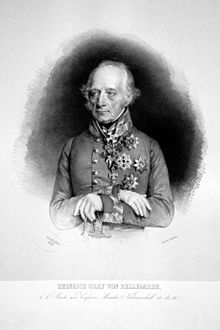Heinrich von Bellegarde
|
Count Heinrich von Bellegarde |
|
|---|---|

Count Heinrich von Bellegarde, Lithography by Josef Kriehuber, 1844
|
|
| Born |
29 August 1756 Dresden, Kingdom of Saxony |
| Died | 22 July 1845 (aged 88) Vienna |
| Allegiance | Saxon, Austria |
| Rank | Feldmarschall |
| Battles/wars |
Austro-Turkish War (1787-1791), War of the First Coalition, Battle of Novi, Battle of Pozzolo, Battle of Caldiero Battle of Aspern-Essling, Battle of Wagram |
| Awards | Military Order of Maria Theresa |
| Spouse(s) | Augusta von Berlichingen |
| Other work | Delegate, congress of Rastatt Governor-general of Galicia Viceroy of Lombardy-Venetia Member (Presiding), Aulic Council |
Count Heinrich von Bellegarde, Viceroy of Lombardy-Venetia (German: Heinrich Joseph Johannes, Graf von Bellegarde or sometimes Heinrich von Bellegarde) (29 August 1756 – 22 July 1845), of a noble Savoyard family, was born in Saxony, joined the Saxon army and later entered Habsburg military service, where he became a general officer during in the Habsburg border wars, the French Revolutionary Wars and the Napoleonic Wars. He became a Generalfeldmarschall and statesman.
Born in Dresden in the Electorate of Saxony on 29 August 1756, his family stemmed from an old line of Savoairds. His father was the Saxon General Johann Franz von Bellegarde (named count in 1741) and his mother was Frau Reichsgräfin Maria Antonia von Hartig. Bellegarde first served in the Saxon army, receiving a commission as a Fähnrich (ensign) in the Infantry Regiment Bork; later as a lieutenant in the Queen's regiment. Transferring his services to Austria in 1771, Bellegarde and distinguished himself leading the dragoon regiment Zweibrück in the War of the Bavarian Succession. In 1781, Joseph II named him major of the Savoy dragoons, and four years later he was colonel of the Dragoon Regiment Berlichingen.
At Batajnica (in German sources called Bexania), a village on the outskirts of Belgrade, at 09:00 on 9 September 1788, Bellegarde engaged in his first feat of arms (the War of Bavarian Succession had no battles): with four squadron of his regiment, he led an attack against the Ottomans entrenched in a line between Batajnica and Semlin; and in the enthusiasm of the attack brought with him a squadron of the Division Zeschwitz Cuirassiers, the Joseph Toscana Dragoons, part of a division of Zelschwit cuirassiers and a squadron of Wurmser Hussars, securing control of a dam and earthenworks on a Danube tributary. By the end of fighting, in which Bellegarde played a pivotal role in leading the Wurmser Hussars to secure control of the earth works, the Ottoman force lost 300 men, and the Austrians lost 31, and 42 wounded. In the course of the following year, Bellegarde, with his dragoons, came under the command of General of Cavalry Count Kinsky. The largest part of the campaign, he remained with his regiment in cantonment, in the Banat, but as part of the force upon which Feldmarshal Laudon could draw. In late summer 1792, the Regiment Archduke Joseph Toscana dragoons transferred to the Netherlands.
...
Wikipedia
